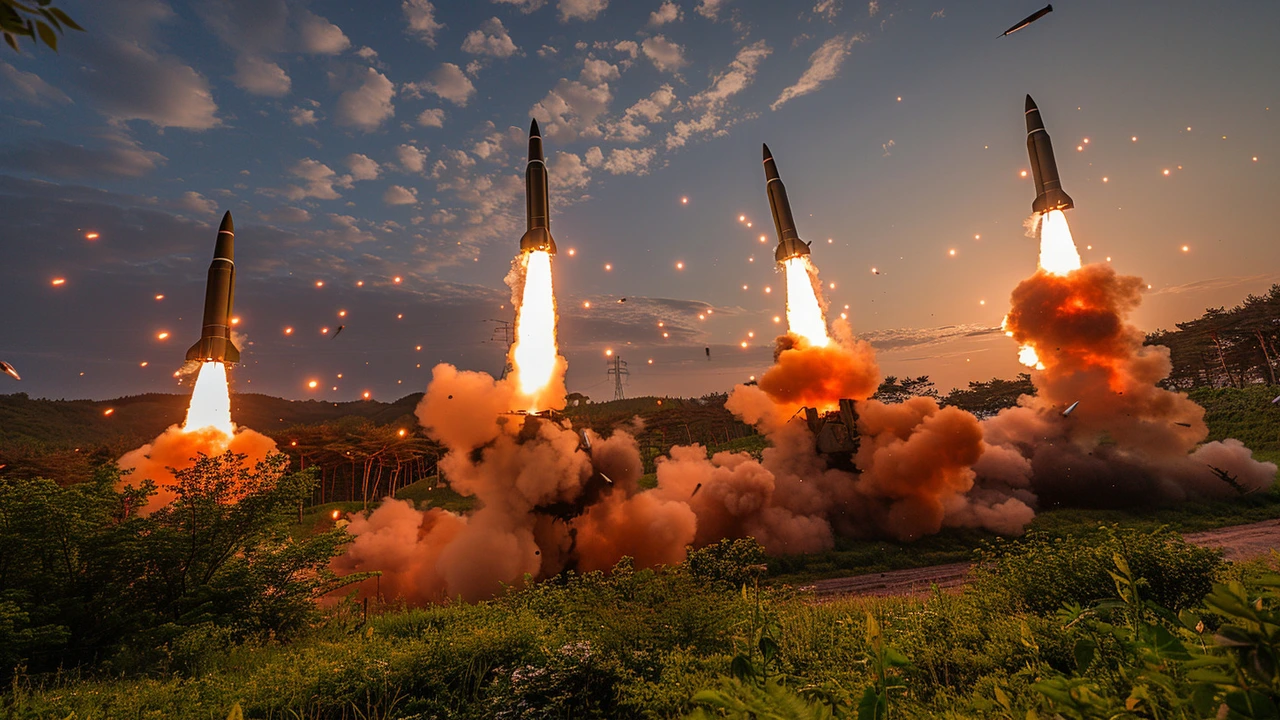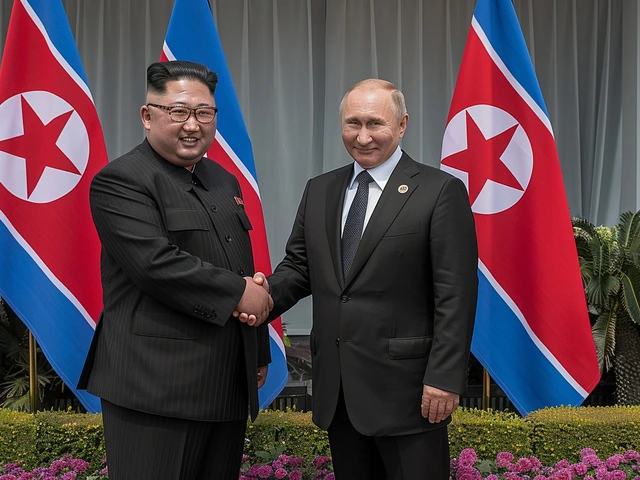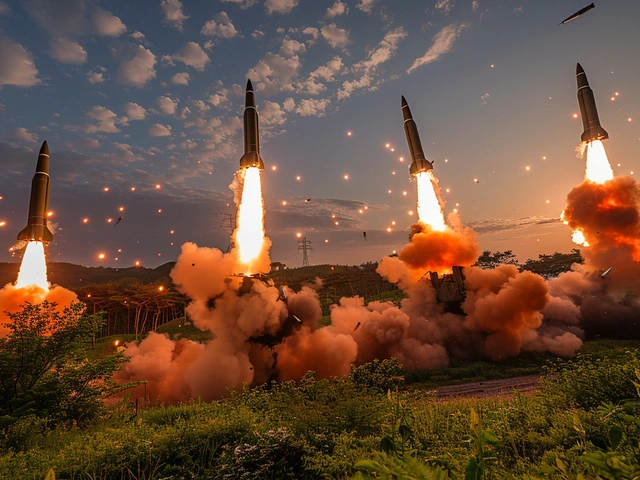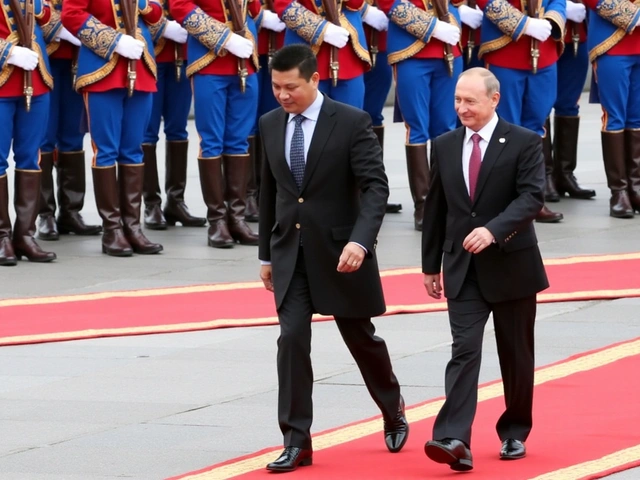
North Korea's Escalating Missile Tests: Kim Jong Un Reinforces Military Might Amidst Regional Tensions
North Korea's Missile Barrage Heightens Regional Tensions
In a bold display of military power, North Korea launched a missile barrage into the East Sea, also known as the Sea of Japan. At least ten missiles were discharged from the Sunan region in Pyongyang, detected around 6 a.m. local time. These actions come directly following Kim Jong Un's recent directive to enhance the nation's defense capabilities.
The launch drew immediate attention from Japan's Defense Ministry, which noted that at least one of the missiles attained an altitude of 100 kilometers and traveled a distance of 350 kilometers before plunging into the sea. Prime Minister Fumio Kishida assured that his administration is in close communication with both the United States and South Korea to monitor the situation. This cooperative approach aims to maintain regional stability amidst heightened tensions.
Kim Jong Un's Call to Arms
Kim Jong Un's call for fortified defense represents a clear strategic pivot towards military enhancement. Addressing his nation's top missile scientists, Kim urged them to redouble their efforts, highlighting the crucial need for a bolstered defense mechanism. This directive reflects North Korea's ongoing pursuit to solidify its sovereignty and security amidst perceived threats.
The recent missile launch is part of a series of provocative actions following a significant setback in Kim's plans to introduce three spy satellites this year. North Korea's second military reconnaissance satellite, Malligyong-1-1, met an untimely demise when its launch vehicle exploded shortly after takeoff on Monday, marking a critical failure in the regime's space and surveillance aspirations.
Propaganda Balloons: An Unconventional Warfare
Adding to the recent tensions, North Korea released approximately 260 propaganda balloons targeting Southern cities and towns. These balloons were filled with trash and excrement, causing considerable distress and prompting air raid warnings from Seoul. In a sharp exchange, the U.S.-led U.N. Command condemned the action, citing potential harm to local populations, while Kim Yo Jong, Kim Jong Un's sister, mockingly referred to the balloons' contents as 'sincere presents'.
Historically, Pyongyang has consistently lambasted propaganda activities conducted by rights activists and defectors in South Korea. These actions often involve sending their own propaganda messages via balloons, perpetuating a cycle of cross-border psychological warfare that adds layers of complexity to North-South relations.
Military Electronics and Border Disruptions
Not limited to missile launches and propaganda, North Korea has also been accused of disrupting GPS signals near the Northern Limit Line, the de facto maritime border between North and South Korea, for two consecutive days. South Korea's military reported these electronic attacks but deemed them largely ineffective. Such tactics are part of Pyongyang's broader strategy to destabilize and exert pressure on its southern neighbor.
Kim Jong Un continues to justify these aggressive maneuvers by underscoring the importance of satellite acquisition for North Korea's defensive and sovereign interests. The pursuit of more spy satellites has been touted as essential to strengthening the nation's deterrent capabilities.
Impact on Regional Dynamics and Security
North Korea's missile tests and other aggressive actions pose significant challenges to regional security. The proximity of these actions to Japan has particularly alarmed Japanese authorities, who have consistently been vulnerable to the North's military exercises. The possibility of missile debris falling onto Japanese soil or waters necessitates a robust and coordinated response to safeguard the nation.
Throughout these provocations, the trilateral cooperation between the United States, South Korea, and Japan remains crucial. Diplomatic efforts and military readiness drills are now the forefront of ensuring stability. Despite these defensive measures, the unpredictability of North Korea's next move keeps tensions on a knife's edge, compelling regional powers to remain vigilant.
Historical Context of North Korean Militarization
North Korea's persistent emphasis on military advancements is rooted in its historical context. The Korean Peninsula remains a flashpoint following the Korean War's armistice, with no formal peace treaty ever signed. This state of dormant hostility influences the North's relentless pursuit of military technology as a cornerstone of its national policy.
From its nuclear tests to missile launches, North Korea has continuously sought to affirm its position and deterrence capabilities. Each development in its arsenal not only challenges regional security but also poses a global non-proliferation threat. Thus, understanding Kim Jong Un's motives requires comprehending the entrenched military-first doctrine that defines North Korean governance.
Future Outlook for the Korean Peninsula
As Kim Jong Un remains committed to advancing his nation's military technology, the Korean Peninsula is likely to endure ongoing tensions. International responses, sanctions, and diplomatic efforts must therefore adapt to these evolving challenges. A sustainable peace and de-escalation of hostilities demand innovative and persistent diplomatic engagement, alongside robust deterrence strategies.
Ultimately, how neighboring states and global powers navigate this complex landscape will determine future regional stability. While immediate resolution appears elusive, maintaining open channels of communication and military readiness can mitigate potential escalations, paving the way for a cautious yet hopeful outlook on Korean Peninsula's future.






